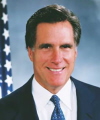Romney, The Speech, and Social Conservatism

The rise of Mike Huckabee in national and state (Iowa, South Carolina, Nevada) polls has come in large part at the expense of Fred Thompson—who was originally viewed as the conservative alternative to Rudy Giuliani. However, Huckabee’s surge has been so large that he has no doubt also taken away some of the initial soft support for Romney and Giuliani. But Romney is touting his social conservative credentials—credentials seemed tarnished by some, not because he is a Mormon, but because he ran as a pro-choice candidate for Governor of Massachusetts.
A recent Associated Press / Pew Research Center poll of likely Republican voters in Iowa, New Hampshire, and South Carolina suggests Morris’ reason for ‘the speech’ might hold true in Iowa, but less so in the other key primary states. The AP/Pew survey asked Republicans which candidate best reflected their “views on social issues like abortion and gay rights.” In Iowa, 27 percent cited Huckabee, with Romney a distant second at 15 percent. But Huckabee did not reach double figures on this issue in either New Hampshire or South Carolina, cited by just 9 percent of Republicans in each state. In New Hampshire, 28 percent named Romney; in South Carolina, Romney, at 15 percent, was just 1 point behind Giuliani and Thompson.
However, Huckabee’s social conservative issue numbers could easily rise in New Hampshire and especially South Carolina as he becomes more well known (most of his resources are poured into the Hawkeye State). Romney is therefore smart to stake his claim to the social conservative mantle.
Romney is already seen by Republican voters in all three states as the candidate best reflecting their views on dealing with taxes, and in Iowa and New Hampshire for making wise decisions about what to do in Iraq and dealing with immigration.
